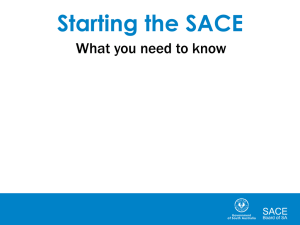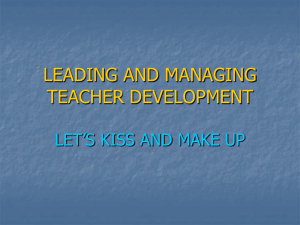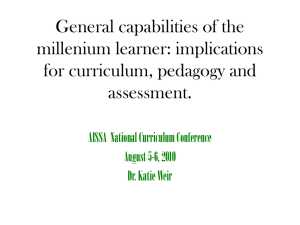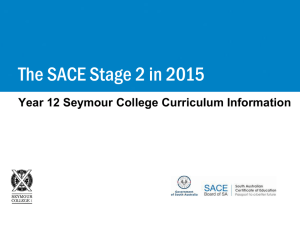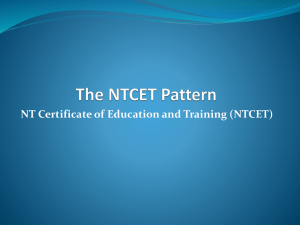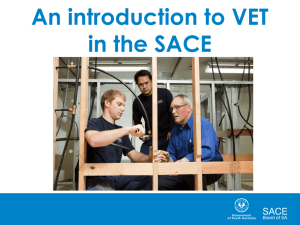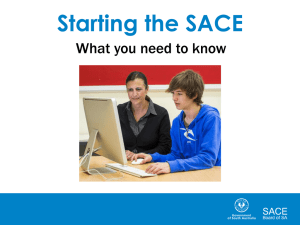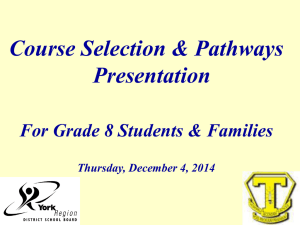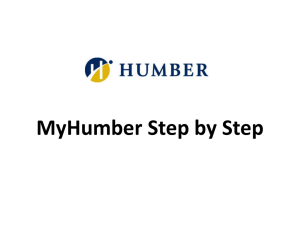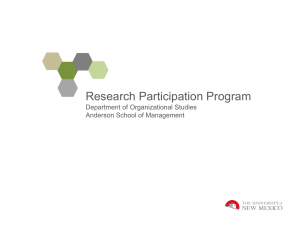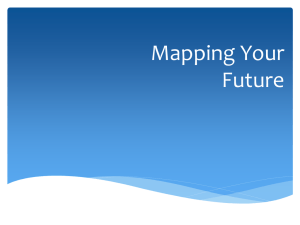Subject Information Night
advertisement
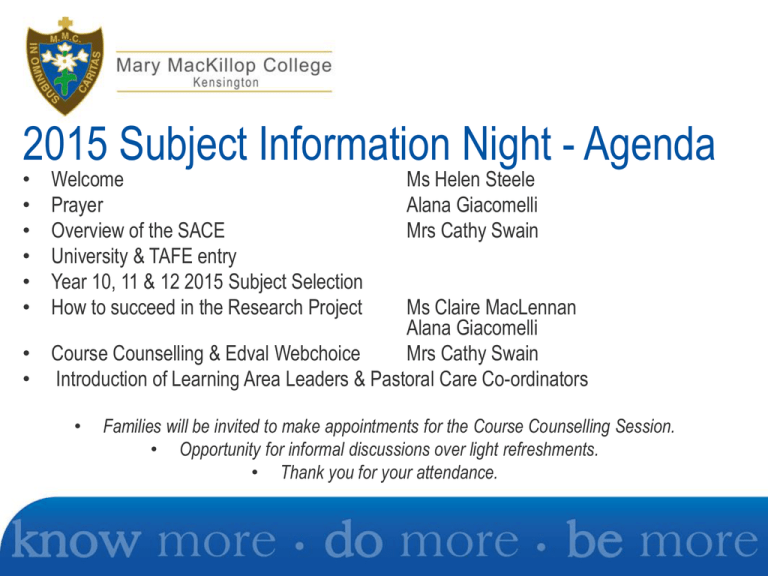
2015 Subject Information Night - Agenda • • • • • • Welcome Prayer Overview of the SACE University & TAFE entry Year 10, 11 & 12 2015 Subject Selection How to succeed in the Research Project Ms Helen Steele Alana Giacomelli Mrs Cathy Swain Ms Claire MacLennan Alana Giacomelli • Course Counselling & Edval Webchoice Mrs Cathy Swain • Introduction of Learning Area Leaders & Pastoral Care Co-ordinators • Families will be invited to make appointments for the Course Counselling Session. • Opportunity for informal discussions over light refreshments. • Thank you for your attendance. Let us Pray Let us join together in Praising God. Together Glory be to the Father, And to the Son, And to the Holy Spirit. As it was in the beginning, Is now, and ever shall be, World without end, Amen. 2015 Subject Information Night For students in Year 10, 11 & 12 – 2015 Presented by Cathy Swain, Director of Curriculum The SACE • SACE - South Australian Certificate of Education • A qualification for entry into universities or further training • Recognised nationally and internationally • A certificate that gives students a head-start on their pathway beyond school Stage 1 & Stage 2 There are two ‘stages’ of the SACE: • Stage 1 is generally completed in Year 11 • Stage 2 is generally completed in Year 12 • This can vary between schools and students (Our students start the SACE with the Personal Learning Plan in Year 10 – compulsory Stage 1) Flexible Pathways in the SACE • The SACE is flexible, and caters for learning both in and outside school • Students can combine study and part-time work, a traineeship or school-based apprenticeship • Students can receive credit for SACE subjects, vocational education and training, community learning, and university studies Requirements to obtain the SACE • Students need 200 credits to achieve the SACE • Most 10-credit subjects are studied over one semester and most 20-credit subjects are studied over two semesters • Students need to achieve a C grade or higher for Stage 1 compulsory requirements and a C- grade or higher for Stage 2 compulsory requirements to achieve the SACE Stage 1 (Year 11) • Subjects are graded from A to E • All tasks are assessed by teachers at the school • Assessment is externally checked in Mathematics, English and the Personal Learning Plan (compulsory elements) • Complete compulsory PLP, 20 literacy and 10 numeracy credits at C grade or better Stage 2 (Year 12) • Subjects are graded from A+ to E• 70% of subject assessments will be assessed by the student’s teacher and moderated by the SACE Board (e.g. in school assignments) • 30% of subject assessments will be assessed externally by a SACE Board assessor (e.g. investigations or examinations) Assessment in the SACE • Each grade (from A to E) in every SACE subject has a ‘performance standard’, describing the type of work that will receive that grade • A student’s SACE work is assessed against these standards • The standards are the same around the state • They help students understand the reasons behind their grades, and how to improve Completion of Stage 2 (Year 12) To achieve SACE Stage 2, students need to complete: • Stage 2 subjects and/or VET (60 credits) • Research Project (10 credits) Most students will complete subjects and courses worth more than 70 credits at Stage 2 Other recognised learning in the SACE The SACE recognises learning both in and outside school, for example: • Vocational Education and Training courses (VET) • University and TAFE courses • Community learning (such as the Duke of Edinburgh’s Award or volunteer work) VET in the SACE • VET stands for Vocational Education and Training • It is education and training that gives students skills and knowledge for work • VET operates through a national training system, and is delivered, assessed and certified by Registered Training Organisations (RTOs) • The SACE Board recognises completed VET, but does not assess or result VET VET in the SACE • The flexibility of the SACE enables students to include a significant amount of VET in their studies • Students can gain recognition for up to 150 (of the necessary 200) SACE credits at Stage 1 and/or Stage 2 from VET • Work with external agencies to offer other VET courses • Mrs Adriana Forte–Careers & Pathways Coordinator VET Recognition Register • • • The VET Recognition Register on the SACE website lists more than 200 popular VET qualifications The Register also shows the SACE level (Stage 1 or 2) and the SACE credits you could earn Certificate II generally count to Stage 1 credits and Certificate III count to Stage 2 Future Pathways – University Entrance • Need to complete the SACE and obtain an ATAR (Australian Tertiary Admission Rank) • Student’s overall achievement in the SACE gives you an university aggregate • University aggregate converted to an ATAR - rank compared with other students –a range from 0 to 99.95 • Selection rank then created from ATAR + bonus points and any other considerations – therefore selection score can be different for different courses and universities • Used by universities in the selection of school leavers for a place in university courses • From 2016 entry the university aggregate is based on 90 credits of Stage 2 study - 3 full-year Tertiary Admissions Subjects (TAS) (3 x 20 credits) plus 30 flexible credits • MMC students currently study 100 credits at Stage 2 *SATAC manage the entry processes and applications for the 3 universities in SA. *Not set the rules just deliver them on behalf of the universities *Calculation of ATARs and selection ranks * Valuable resource SATAC website University Entrance from 2016 To be eligible, a student will need to have: • Completed the SACE • Gained an ATAR • Gained a university aggregate from 90 credits as outlined in the SATAC guide • Met any prerequisite subject requirements needed for the university course • Complied with rules regarding subject combinations and counting restrictions TAFE Entry Requirements • Complete the SACE and obtain a TAFE selection score • To obtain a TAFE selections score students must – 60 credits of Stage 2 with 40 of these credits from TAS subjects and maximum of 20 credits from other recognised subjects Year 10 in 2015 • Compulsory subjects: – English, Mathematics, Science, Religious Education – Semester of Geography & History – Stage 1 Personal Learning Plan (10 SACE credits) • Choice of 6 elective subjects: (Check for Year 11 Pre- Requisites) – Visual Arts (Art), Visual Art (Design), Drama, Music, – Digital Technologies, Information Processing & Publishing – Commercial Cookery& Garment Construction or Creative Culinary and Textile Design – Physical Education – Italian Personal Learning Plan (PLP) • Compulsory Stage 1 subject worth 10 credits • C grade or higher is needed • Completed in Year 10 at MMC – help choose future SACE subjects and pathways • Set personal and learning goals, explore career/study pathways, help to plan subject choices for Year 11 & 12. • Gain skills for future study and employment Year 11 & 12 2015 • Getting you ready for the next stage of your life • Consider your strengths & weaknesses • Choose subjects in learning areas or are pathways to careers that interest you • Use Curriculum Handbook & SACE website for more information about the subjects Year 11 in 2015 • Must complete 20 credits of literacy and at least 10 credits of numeracy with C grade or better • Most subject are semesterised • Increased choice & specialisation • Important to check prerequisites for Year 12 subjects • New subjects – Accounting, Information Technology, Business & Enterprise, Child Studies, Food and Hospitality, Ancient Studies, Modern History, Legal Studies, Science Specific (Biology, Chemistry, Physics, Nutrition, Psychology), Tourism, Integrated Studies (Studies of Asia) Year 12 in 2015 • Compulsory Research Project (10 credits) and Religious Education (10 credits) • Choose 4 x 20 credit subjects • Consider prerequisites, assumed knowledge • Check precluded combinations or counting restrictions. New Year 12 Subjects • Workplace Practices • Scientific Studies Research Project • All Stage 2 students study the Research Project (10 credits) • A chance to do in-depth research and study in a topic that interests the student and develop skills in planning, research, analysis and communication • Develop skills & understandings to help prepare for a life after Senior School • Independent learning - you decide your question and the direction of your research • Helps prepare you for future studies and develops workplace skills. • Tertiary-style study; evidence of skills valued by employers & tertiary institutions. • Compulsory 10 credits – C- or better Why is the Research Project important? • One of the most important skills for a student to develop is the ability to learn. • Learning occurs through careful thought and planning, trial and error, resilience, analysing, producing or creating and then evaluating and reflecting on the process and the results. • The research project is structured to ensure students learn these skills and enhance their independent learning. What is involved in the Research Project? • • • • • Students pose a research question with the scope to synthesise or ‘create new knowledge’ While they are taught the skills to scaffold and manage their research and address the performance standards, each question takes the students on an individual research pathway Teachers act more as mentors for each student. Rather than providing students with content, teachers help students develop and hone skills to independently manage the project from start to finish. Students produce an ‘Outcome’ as an answer to their question. Students then write an ‘Evaluation’ reflecting on their research methods, how they faced challenges and opportunities and how effectively they answered their question. Where does the Research Project sit within the SACE? • It is a compulsory Stage 2 10 credit subject • Students must achieve a C- or better to receive their SACE • It runs in Semester 1 during Year 12 at Mary MacKillop College • This year, we are running Research Project workshops in Semester 2, Year 11. Assessment School Assessed (70%): • Folio (10 page ‘snapshot’) - 30% • Outcome (2000 wds) - 40% Externally Assessed (30%): • Evaluation (1500 wds) - 30% What questions can students ask? • Anything – the more passionate and interested in finding answers to their question the better: • ‘What are the difficulties that adolescent twins face in forging individual identities and how can • • • • • they best navigate through them?’ ‘To what extent do violent video games have an effect on the development of youth?’ ‘Should the legal drinking age in Australia be raised to 21?’ ‘To what extent do knee injuries (ACL) impact the careers of AFL player?’ ‘How does Early Years Swimming affect the development of a child?’ ‘How can I best create a seasonal cook book with meals that can be made in 15 minutes?’ Questions? What’s in my pack? • MMC 2015 Curriculum Handbook • Subject Selection Form (please bring to course counselling completed) • Edval Webchoice instructions • SATAC Tertiary Entrance Booklet (2015 Year 11 & 12) • SATAC University Guide (2015 Year 11 & 12) Course Counselling • Tuesday 12 August 3:30 – 8:00pm in library • Highly recommended for Year 11 & 12 students in 2015 • Open to 2015 Year 10 students • Bookings taken • Subject Selection Forms Edval Webchoice • Is an online system designed to capture student subject selections • Selections are validated according to curriculum rules • Captures both primary and reserve preferences in priority order • Students can login at anytime from home to make or change their selections Edval Webchoice Making your subject choices • Results you have obtained so far • Enjoyment and willingness to work in the subject • Subjects needed for possible courses (prerequisites, assumed knowledge, helpful subjects, interstate) • Advice from subject teachers, PCC, DoC, career counsellors, parents • Is possibility subjects may not run or clashes on timetable – speak with students later this term or early next term. Supper & Discussion Learning Area Leaders • Ms Mini Del Corso – English • Mrs Barbara Morrish – Mathematics • Mrs Josie Spizzo – Sciences • Mrs Adriana Sotira – Religious Education • Mrs Mary Lepore - Languages • Mr Gavin Hughes – Music • Ms Emily Bishop – Health & Physical Education • Mrs Cathy Swain – PLP & RP Pastoral Care Coordinators • Year 9 - Ms Claire MacLennan • Year 10 - Mrs Jeanene Corbo • Year 11 – Ms Miescha Hawkins Other Staff • Ms Helen Steele – Acting Principal • Ms Adriana Forte – Careers & Pathways Coordinator • Mrs Angelina Ranaldo – Year 12 PCC and Inclusive Education Coordinator
